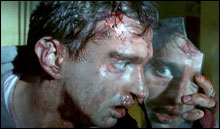 Night Watch is a completely synthetic yet thoroughly original movie. The film’s influences and borrowings are continuous and brazen, yet the result feels fresh, new, exciting, and utterly disorienting. It’s the film that genre-movie lovers — and maybe some of the rest of us — have been pining for since Peter Jackson left Middle-earth.
Night Watch is a completely synthetic yet thoroughly original movie. The film’s influences and borrowings are continuous and brazen, yet the result feels fresh, new, exciting, and utterly disorienting. It’s the film that genre-movie lovers — and maybe some of the rest of us — have been pining for since Peter Jackson left Middle-earth.
Like the Lord of the Rings, Matrix, and Star Wars franchises, this Russian import (the first of a trilogy) features a mythology as old as Joseph Campbell illuminated with cutting-edge digital effects. It’s a tale of two warring bands of Others, mortals gifted with supernatural powers. (Some are shapeshifters or telekinetics; some are witches or vampires.) For a thousand years, an uneasy truce has held between the Light Others and Dark Others, who police each other’s activities. In present-day Moscow, however, the balance is about to be overturned by two newcomers: a cursed virgin who brings misfortune and tragedy to everyone she meets, and a Great One who will end the battle once and for all, but in favor of which side?
The Light Others are not unambiguously good, and neither are the Dark Others unambiguously evil. People on both sides do one another small favors and occasionally look the other way at their enemies’ misdeeds. Anton (Konstantin Khabensky), a Light Other who has visions of the future, once tried to hire a witch to lure his ex-girlfriend back by using a spell that would have caused her to miscarry her fœtus. Later, Anton kills a vampire, Andrei, during a fight but is unable to help the bloodsucker’s girlfriend, a non-Other whom Andrei afflicted with his curse, get cured of her dark addiction. Such innocent mortals often become collateral damage in the struggle, and when the Great One finally arrives (he’s a boy who’s a fan of Buffy the Vampire Slayer) and chooses sides, he finds the differences between the two are not at all clear-cut.
In other words, joining the Hollywood-style metaphysics and the Tarkovskian sense of mediæval mysticism and fatalistic gloom is a contemporary, post-Soviet awareness of total corruption and anarchy, one made physical in the movie’s unrelenting depiction of Moscow as a city in decay marked by crumbling tenements, layered grime, and the constant buzzing of mosquitoes. When it comes to grit and rot, Night Watch makes The Matrix and Sin City look like Toy Story.
Timur Bekmambetov recognizes that there’s a certain bleak thrill in this kind of merciless grimness, especially when it’s filmed at a breakneck pace with seemingly endless visual invention. You won’t soon forget images like the doll that sprouts spidery legs and skitters across the floor, or the way the blood drinkers view people’s bodies as invisible frames for networks of veins and arteries, or the tracking shot that follows a popped airplane rivet on its descent through the sky into a building’s heating vent and finally into a woman’s teacup. I left the film eager to see how Anton and his colleagues would prepare for the impeding apocalypse but even more eager to see what tricks Bekmambetov has in store for the next exhilarating ride.